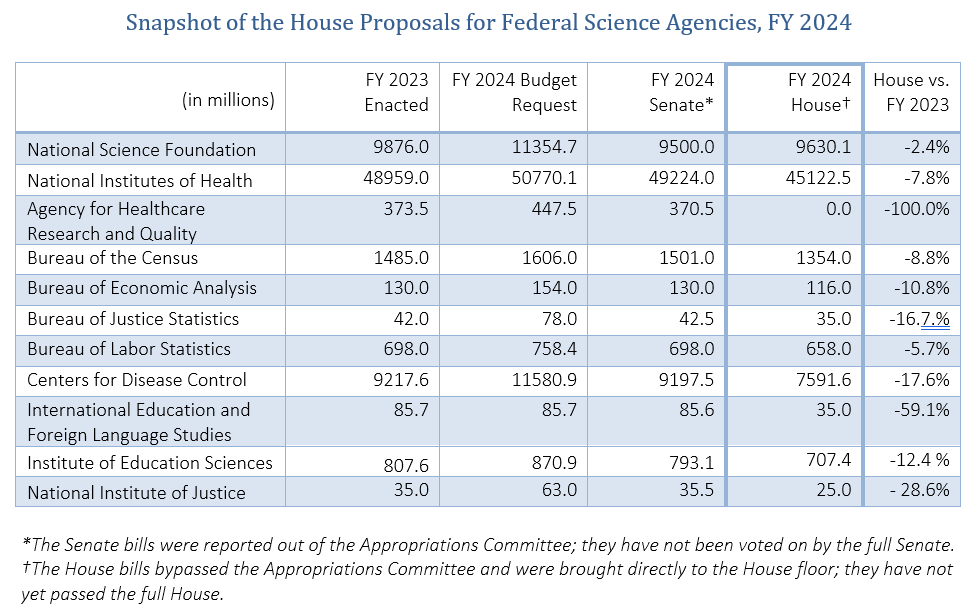COSSA advocates for sustainable federal funding for and widespread use of social and behavioral science research and federal policies that positively impact the conduct of research.
NSF
Competing Visions: The NSF for the Future Act and the U.S. Innovation and Competition Act
Summary
In June 2021, the House and Senate advanced separate versions of legislation to enhance U.S. innovation and global competitiveness. The approaches taken by the two bills, however, differ dramatically. The Senate bill focuses squarely on ways to harness and in some cases alter the nation’s scientific assets to better compete with China. The House bill, on the other hand, doubles down on the nation’s existing, proven scientific leadership and proposes additional investments to push the U.S. research enterprise—particularly the National Science Foundation—in new directions.
Despite the many differences between them, some parallels can be found; for example, both propose establishing a new directorate at the National Science Foundation focused on technology development and translational research, and both measures include substantive provisions related to research security and STEM education. Beyond that, though, many unresolved differences remain.
The following pages include COSSA’s in-depth analysis and comparison of provisions in the National Science Foundation for the Future Act (H.R. 2225) and the U.S. Innovation and Competition Act (S. 1260) that are of most relevance to the social and behavioral science community.
COSSA Statement in Support of the National Science Foundation for the Future Act (H.R. 2225)
The Consortium of Social Science Associations (COSSA) is pleased to endorse the bipartisan National Science Foundation for the Future Act (H.R. 2225), introduced by leaders of the House Science, Space and Technology Committee, Representatives Eddie Bernice Johnson (D-TX), Frank Lucas (R-OK), Haley Stevens (D-MI), and Michael Waltz (R-FL). We are especially appreciative of the open and consultative process used to develop this important legislation and attention paid to the utility of the social and behavioral sciences in bringing scientific findings to bear on solving critical societal challenges. Further, the NSF for the Future Act takes a holistic approach to NSF reauthorization, recognizing that U.S. scientific leadership and competitiveness hinge not only on technological advancement, but on support for research starting at the most fundamental level and across all domains of science.
The U.S. scientific enterprise requires stability, predictability, and sustainable funding growth to thrive. Just as importantly, it requires an environment that allows it to invest in the best ideas and take risks to achieve transformative scientific advancements. The NSF for the Future Act authorizes five years of sustained funding growth to address years of stagnant budgets, invests in strengthening the STEM pipeline—most notably, by broadening access to research opportunities to those historically underrepresented—and proposes the establishment of a new Directorate for Science and Engineering Solutions aimed at supporting “use-inspired” research to address “areas of societal and national importance.” Further, it reaffirms peer review as the process by which the scientific merit of individual proposals is assessed, advancing the rigor, impact, and innovation that are hallmarks of world class basic research.
The legislation thoughtfully balances the critical need to preserve NSF’s defining role—to be an incubator for basic scientific discovery across all areas of science—while moving the agency in new and exciting directions. COSSA appreciates the thoughtful manner in which the legislation has proposed establishing a new directorate focused on use-inspired research to address some of the most complex societal challenges, including giving NSF leadership the responsibility to identify focus areas for the directorate. We look forward to continued engagement with the bill’s sponsors to define a role for the new directorate that complements existing NSF research activities, increases opportunities for all STEM fields—including the social and behavioral sciences—and advances the agency’s mission while adhering to its core principles of fundamental research.
Finally, COSSA applauds the attention paid to improving diversity, equity, and inclusion in STEM and ensuring safe and inclusive research experiences free from harassment and discrimination. The legislation recognizes that broadening participation in STEM requires the dismantling of structural barriers at the institutional level—an insight research from the social and behavioral sciences has helped to illuminate. The NSF for the Future Act includes proposals to enhance NSF’s efforts in this regard and expand access to research opportunities by codifying the INCLUDES initiative, increasing resources for graduate training and mentorship, enhancing the Graduate Research Fellowship Program, and creating a pilot program to encourage partnerships with “emerging research institutions.”
NSF’s discovery-driven mission has enabled countless scientific breakthroughs over its more than 70-year history and will continue to guide the American scientific enterprise to new frontiers. COSSA looks forward to working with the bill’s sponsors to develop the strongest possible reauthorization for NSF that includes robust, sustained funding, promotes diversity, equity and inclusion in the scientific enterprise, and keeps the U.S. at the fore of discovery.
HHS Announces Final Changes to Human Subjects Research Regulations
Summary
During the final days of the Obama Administration, the U.S. Department of Health and Human Services (HHS) released the final text for its changes to the Common Rule, the regulations that govern research with human subjects, completing a revision process started in 2011. The Common Rule, which was last updated in 1991, affects research supported by 16 federal departments and agencies, including the Departments of Health and Human Services, Agriculture, Defense, Education, Commerce, Labor, and Veterans Affairs, as well as the National Science Foundation.

